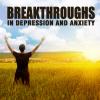How long do ssris work? I hear so many people that say they don't work long etc... They have been working for me for 4 years now.... has it worked longer for anyone else ?

#1
Posted 13 May 2014 - 05:08 AM
#2
Posted 13 May 2014 - 01:54 PM
Research fairly clearly (theoretically as well) suggests that the longer someone is maintained on an SSRI the more likely it is to keep working.
If you have only had one moderately severe non-chronic episode without family history of suicide or depression that wasn't treatment reistant you probs only need to stay on it for 9-12 months. For severe, chronic, family history or 2 episodes its best to use it for two years. In cases of multiple treatment resistant episodes, having had 3 or more episodes, extreme severeity (catatonic, stupors, near catatonic/stupors, psychotic), treatment refactory or intractable depressive episodes then long term 5 years-indefinate treatment is recommended.
sponsored ad
#3
Posted 14 May 2014 - 01:33 AM
Research fairly clearly (theoretically as well) suggests that the longer someone is maintained on an SSRI the more likely it is to keep working.
If you have only had one moderately severe non-chronic episode without family history of suicide or depression that wasn't treatment reistant you probs only need to stay on it for 9-12 months. For severe, chronic, family history or 2 episodes its best to use it for two years. In cases of multiple treatment resistant episodes, having had 3 or more episodes, extreme severeity (catatonic, stupors, near catatonic/stupors, psychotic), treatment refactory or intractable depressive episodes then long term 5 years-indefinate treatment is recommended.
Thanks for your response... in my case I first got it at age 17 and have had 4 episodes since then I am 33 now. It was on my fourth episode when I was 29 that I decided to go on it.... It has prevented relapse I just wish others had some actual personal experiences
#4
Posted 14 May 2014 - 09:07 PM
I have been on and off ssris/snris for five years, and my conclusion is they do work. I have, however, had to up my dose of my current ssri because I wasn't getting the same effect, but I think it was due to me taking another drug which lowers serotonin, zyprexa. So yes, if it has been working for you for four years it should continue to work. I personally having never experienced it "pooping out" like so many people describe-- honestly, I think that those for whom it "poops out" are encountering more stressful life events, and thus it stops working. Just a theory though.
#5
Posted 15 May 2014 - 12:38 AM
I have been on and off ssris/snris for five years, and my conclusion is they do work. I have, however, had to up my dose of my current ssri because I wasn't getting the same effect, but I think it was due to me taking another drug which lowers serotonin, zyprexa. So yes, if it has been working for you for four years it should continue to work. I personally having never experienced it "pooping out" like so many people describe-- honestly, I think that those for whom it "poops out" are encountering more stressful life events, and thus it stops working. Just a theory though.
That could be true, I kind of always thought that maybe it never worked for them in the first place and their depression went into remission and simply came back... but that was also just a theory ![]()
#6
Posted 19 May 2014 - 09:50 AM
I've been on and off, mainly on though, antidepressants since 2005. So just over 9 years. Struggled to find one that suits me the whole time. Its usually good for one thing but then very negative for another aspect of my life as I suffer from depression and an anxious disposition. My first one was paroxetine which I was on for about 2 years. Was decent and I was a likeable person on it! But I was also quite anxious on it and had several sickies at work and just didn't give a crap. Eventually I quit it. Had a bad time then went back on. Wasn't motivating me for work reasons so I then went on the Anti-Depressant tour bus!
Been on sertraline, escitalopram, duloxetine, fluoxetine and basically every other anti depressant out there. Then eventually came Venlafaxine. WOW! Was not expecting the effects that came with it. All the other anti-depressants had basically no effect on me. Tried Venlafaxine and I went from being really depressed, hopeless and very anxious to the most self-confident, high and happy person I've ever been! I was on fire. Felt invincible! My performance playing sports went up, was life and soul of parties when usually I'd be in the corner, half the time sleeping from drinking alcohol! I was on the dancefloor all the time! And chatting up women became natural! I had some of the best one night stands on Venlafaxine! lol. This was the non-XR version. I told the Psych how things were it could wear off quick and give withdrawals so they put me on the XR version next and that was me for a while. Still pretty anxious so Quietiapine was added. Felt good on this but then I put on half a stone in 2 weeks from constant eating. That was despite playing sports! And had zero sex drive. So quit the quietiapine.
Venlafaxine was good for work. I was on the ball all the time. Not stressed out although still anxiety symptoms. I could live with that but then I got with the soon to be wife and she hated me on it. Apparently I was very nice to her on it. and to be honest I wasn't. Became pretty paranoid and didn't trust her. After work I was quite an angry irritable person when home. I think it was due to venlafaxines short half life. Even on the XR version. I felt the high of the day really dissipated and became a very irritable, angry feeling in the evening.
So it was goodbye to Effexor.
Since then I've been on Mirtazapine which I found helpful at work but I was so tired on it that I had no energy for much else especially my son. And despite my complaints of tiredness the Psych but me on Trazodone which im on now. Its awful. So tired and its killed me physically! I have no coordination and everytime I stand up from sitting down I'm all over the place.
She seems to think the pills that knock me out are the way to go at the moment! I'm not so sure. I'm just freaked out and scared of pills now after all this. There is always some aspect or side effect of the pill that has enough of a negative impact on my life that I cant take it. I feel now I'm addicted to trying new things to find something that works. I'm getting married in a couple of months and am at a loss where to turn to now.
Currently started taking magnesium, b complex vitamins and fish oil. Did try inositol too but I couldn't get off the toilet. I don't know if it was that or maybe magnesium...but I quit that first to test and I amnt on the toilet as much! lol
Anyway my tale is not so great but we are all different with different symptoms and different life situations. I'm sure these pills are good for some people. I just wish I could find a good combo for myself!
#7
Posted 19 May 2014 - 11:42 AM
I say it time and time again. Many people don't fully improve with pharmacotherapy alone. Often psychotherapy MUST be combined to reach a full effect. Daily mindfulness between 10-30 mins a day can have a dramatic improvement on mood and anxiety in 6-8 weeks. CBT is very effective or interpersonal therapy (if many of your problems are with how you interact with people).
That being said it is possible that you actually have a subclinical bi-polar disorder, often known as Bi-polar IV. Repeated breakthroughs of depression on medication, activating effects reminicent of sub-clinical hypomania and a quick response to quetiapine are all indicators. Bi-polar IV is normally coded under Bi-polar NOS in the DSM (although most psychiatrists will diagnose Major depressive disorder). You had a lack of response to SSRI's alone and this could indicate you do 'just' have a depressive disorder. Either way I think its worth trying to treat it as a bi-polar disorder by adding in a mood stabilizer alongside an antidepressant you know to work reasonably well (Venlafaxine - assuming you used the highest dose of Venlafaxine 225 - if not maxing the dose may mean you don't become irritable after work). Aripiprazole is approved for use alongside an antidepressant in treatment resistant depression and is known to cause significantly less metabolic side effects than the other atypicals and also less sedation (it can even be activating). Its most significant negative is that it can worsen anxiety but the likelyhood of this is no more than equal to SSRI's. Another option is lamotragine - which is approved for bi-polar depression maintance but not major depression. However if you do fit into the bi-polar spectrum it may well prove to be very effective. A similar option would be option could be the combination of a sedating antidepressant and an activating one. We know Velafaxine works and this could be combined with trazadone or mirtazapine (known as calafornian rocket fuel) and this is often very effective at treating depression. Trazadone or Mirtazapine could also be combined with Bupropion. Another option is Moclobremide which is an RIMA (MAOI but without all the horrible side effects, food interaction risks and reasonable drug interaction profile). MAOI's have been tendtaively shown to be more effective for the type of depression below - although RIMA's haven't strictly been tried.
Other indicators of it being more of a bi-polar disorder include sleepiness (and hypersomnia (sleeping 10+ hours a day)), leaden paralysis (feeling as if your arms, head and legs are almost weighed down), irritability, increased appetite, increased or normal (or nearly normal) sex drive, increased suicidality/self harm risk, interpersonal rejection sensitivity (easily upset by people), no or little guilt and possibily trouble getting to sleep but normally once asleep you sleep well and don't wake up early.
Remeber, you need AT LEAST twelve weeks to be sure if an AD will work and at least 6 of those weeks should be at an increased dose from the lowest effective dose. For example if its Venlafaxine at least six weeks should be at 150mg and ideally at week ten the dose would be increased to 225mg.
#8
Posted 19 May 2014 - 03:12 PM
Tried therapy and it was okay. But that was few years ago. I've on just started seeing the psychiatrist again after being on the waiting list and maybe she will suggest this when medication is stabilized.
That is a great post you have given, thanks. It will give me ideas for my next appointment. I was on Venlafaxine at 150mg and at one point was on venla 150 mg and mirtazapine 30mg together. It didn't work out though as I felt like a zombie with no emotions. The venlafaxine wore off further on through the day and then mood swings start. Maybe going upto 225mg like you said would be a good idea though. I'd never been so high.
I have some of the symptoms you mention for bi-polar like hypersomnia, leaden paralysis. But I don't have any sex drive when i'm not taking any medications, not really suicidal or self harm risk and I actually feel too much guilt sometimes. Trouble getting asleep yes and when i'm asleep i'm fine and don't wake early yeah. Easily upset by people, yup! I also don't have any great hyper moments though when not taking medication. And basically find it hard to be happy about anything.
But thanks again for your suggestions, they really could be quite helpful for me.
#9
Posted 19 May 2014 - 03:15 PM
What you have described with the Venlafaxine could well be sub-clinical hypomania (I don't see any overt evidence of full blown hypomania, although its easy to miss and I haven't actually ever met you). So if you do use 225mg the dose it may be best to combine it with a mood stabilizer.
With psychotherapy its a lot like medication. Give it time, give it more time and then give it more time. If it still isn't working its time to change the type/intensity/group or single/therapist. But in the majority of patients that have been depressed for longer than a year some type of psychotherapy is going to be vital in improving the suituation. As I mentioned you can take up mindfulness by yourself. A lot of people poo-poo psychotherapy (and psycho-social changes) because they think they have a biological disorder or because they tried it and it didn't work.
Depression, anxiety and nearly every other mental health disorder is a cognitive neurobehavioual disorder. Often people have screwed up neurophysiology which influences there mood and anxiety levels and how they process and relate to new information and suituations. They may have also been taught to think in certain ways by repeat exposure and there brain develops complex neural pathways which contain schema (or world views), a typical example in a depressed person might be "I'm useless at everything so why bother". This influences there reaction to an event (for example a new job offer (that they are prefectly capable of)) and they then decline the offer believing they are useless. They then look at all their friends from school who are earning more etc...and wonder why they can't be like them. This further lowers their mood and renforces their believe that they are useless and at a biological level there body releases cortisol and adrenaline (worsening their mood and sleep and increasing anxiety), which distrupts hippocample neurogensis (causing cognitive problems and changing neurochemistry) and the cycle continues. This is just one many possible examples (and its seriously oversimiplied) but I hope it shows you that one, psychotherapy is important in treating mental health problems (no medication can change an idea). And two psychotherapy is a 'biological therapy' in that it influences biology (there is clinical evidence showing certain psychotherapies change neurophysiology and impact symptoms that antidepressants don't (at least as much)).
Behavioual activation is vital to recovery from depression. Sometimes this comes naturally as there mood improves from antidepressants/psychotherapy and other times it needs an extra little push. Forcing yourself to soicalize more, be more active, do things that need doing and prasing yourself for each little achievement no matter how small it is very important.
Edited by Tom_, 19 May 2014 - 03:32 PM.
#10
Posted 20 May 2014 - 04:25 AM
Well I have never had a hypomanic episode as far as I can tell... I went back to my old dose of ssri and I have been pretty good now... I still cannot figure out what a hypomanic episode is tbh but I have never spent a ton of money I never felt a very high moment unless I was drunk... about once a year I get racing thoughts but that is it and it only lasts about 30 mins or so but when I get them I never have a high mood or anything... just normal. I have had that before I have been on any AD... right now I have been on Lex for 4 years and it has worked... I am just wanting reassurance that it will keep working unfortunately that does not seem like the case.
#11
Posted 20 May 2014 - 09:21 AM
That was in reply to Alcapoine (how ever you spell it, I refuse to scroll up :L).
I don't know where you got the idea that they don't keep working. As I've said most of the research shows once you have acheieved remission you are much less likely to have another depressive episode - even if you come off them.
sponsored ad
#12
Posted 21 May 2014 - 03:35 AM
That was in reply to Alcapoine (how ever you spell it, I refuse to scroll up :L).
I don't know where you got the idea that they don't keep working. As I've said most of the research shows once you have acheieved remission you are much less likely to have another depressive episode - even if you come off them.
Well when coming off them I have horrible withdraw symptoms so I have never been able to do that... as far as another depressive episode I don't know it seems like the internet is full of mixed reviews on that some people say it poops out some say it makes depression worse... probably a lot of people who are in remission don't give a shit and enjoy life and don't post on forums... I guess my point of starting this was to get peoples experience and try to figure that exact issue out. I wish I could believe what you said.
Also tagged with one or more of these keywords: ssri
Science & Health →
Brain Health →
Mental Health →
SSRI effectsStarted by Ellipticality , 19 Aug 2021 |
|

|
||
Science & Health →
Supplements →
Something for SSRI induced Fatigue?Started by elc202 , 27 Jul 2021 |
|

|
||
Science & Health →
Brain Health →
Mental Health →
Dapoxetine makes me feel fantasticStarted by Clavius , 10 Nov 2020 |
|

|
||
Science & Health →
Brain Health →
Mental Health →
Zyprexa & SSRI withdrawalStarted by Wicksy , 29 Oct 2020 |
|

|
||
Science & Health →
Brain Health →
Nootropic Stacks →
Mitochondrial healing and anti-inflammatory stackStarted by MarcR , 30 Sep 2020 |
|

|
1 user(s) are reading this topic
0 members, 1 guests, 0 anonymous users












































